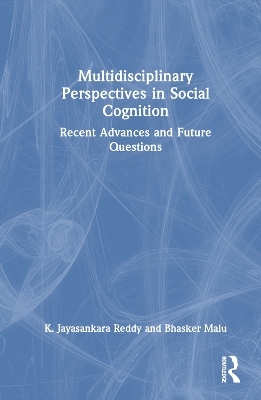
Multidisciplinary Perspectives in Social Cognition
Routledge (Verlag)
978-1-032-81440-7 (ISBN)
- Noch nicht erschienen (ca. März 2025)
- Versandkostenfrei innerhalb Deutschlands
- Auch auf Rechnung
- Verfügbarkeit in der Filiale vor Ort prüfen
- Artikel merken
Organised into five parts, each chapter provides a concise introduction to a specific topic within social cognition, followed by an in-depth exploration of prominent areas of research, the impact of technology, and potential future questions. The book covers core principles of social cognition alongside application in clinical interventions, with topics including how social cognition evolves throughout the lifespan, the impact of technology and social media on social cognition, and how conditions like autism, schizophrenia, and dementia affect social processing. It links social cognition with critical cognitive domains, including attention, memory, and decision-making, highlighting how these processes interact in shaping social behaviour. The book also combines cross-cultural research with relevant studies to show the differences and similarities in social cognition across geographical distances. Each part concludes with guided questions and answers for students to test their understanding knowledge and learning outcomes. By synthesizing current research and identifying future directions, this book offers valuable insights and potential solutions to the complex challenges in the field of social cognition.
Bringing together foundational concepts with advances in the field, the book is ideal reading for students of social psychology, cognitive psychology, social neuroscience and neuropsychology. It will also be of interest to students and researchers of clinical psychology, providing a foundation for future research in applied settings.
K. Jayasankara Reddy is a Professor of Neuropsychology and Cognitive Neuroscience and Dean of the School of Social Sciences at Christ University, Bangalore, India. Bhasker Malu is an Associate Professor at the Jindal Institute of Behavioral Sciences (JIBS) at O.P. Jindal Global University, India
Part 1: What is Social Cognition and how it is studied? 1. Social Cognition and its Emergence 2. Methods, Procedures, Latest Trends in Social Cognition Research Part 1: Guided Questions and Answers Part 2: Cognitive Perspective: How Cognition Processes Social Situations 3. Attention and Perception in the Social Cognition 4. Affect Motivation and Behavior 5. Memory, Learning, and Language in the Social Cognition 6. Applied Decision Making 7. Information Processing and Social Media Part 2: Guided Questions and Answers Part 3: Social Perspective: Cognition Underpinning Social Behavior 8. Social Cognition and Attitude, and Attribution 9. Prejudice and Stereotype 10. Theory of Mind, Self and Others 11. Social Perceptions and the Online World 12. Understanding Cross Cultural Perspective in Social Cognition Part 3: Guided Questions & Answers Part 4: Social Cognition Across the Lifespan and Clinical Presentation 13. Social Cognition in Early Years - Infancy and Adolescence 14. Social Cognition and Aging 15. Impact of Technology on Lifespan Development 16. Social Cognition in Clinical Disorders Part 4: Guided Questions & Answers Part 5: Applications 17. Interventions using Social Cognition 18. Application on the Social World – Design thinking, UX/UI research, Digital Communication 19. Rehabilitation: Improving Social Cognitive Skills Part 5: Guided Questions & Answers
| Erscheint lt. Verlag | 31.3.2025 |
|---|---|
| Zusatzinfo | 4 Line drawings, black and white; 4 Illustrations, black and white |
| Verlagsort | London |
| Sprache | englisch |
| Maße | 156 x 234 mm |
| Themenwelt | Geisteswissenschaften ► Psychologie ► Allgemeine Psychologie |
| Geisteswissenschaften ► Psychologie ► Entwicklungspsychologie | |
| Geisteswissenschaften ► Psychologie ► Sozialpsychologie | |
| Geisteswissenschaften ► Psychologie ► Verhaltenstherapie | |
| ISBN-10 | 1-032-81440-3 / 1032814403 |
| ISBN-13 | 978-1-032-81440-7 / 9781032814407 |
| Zustand | Neuware |
| Informationen gemäß Produktsicherheitsverordnung (GPSR) | |
| Haben Sie eine Frage zum Produkt? |
aus dem Bereich


